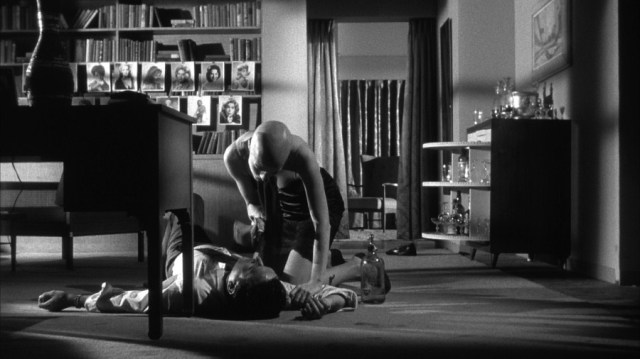
The Naked Kiss opens violently and with bravura. Without warning, before a single opening credit flashes up, we in the audience are being fiercely attacked by a woman using her purse. Although we at first assume the point-of-view of, and subsequently sympathize with, the victim, we soon realize that this victim is no victim at all. The “victim” is a sleazy, seedy, drunken pimp and the perpetrator a prostitute by the name of Kelly, the protagonist. It is the first of many clever subversions employed by writer/director Samuel Fuller in a film about appearances and what that means, or doesn’t mean.
The setup is intriguing and pulpy, prime for Fuller’s brash melodrama: Kelly (a lively, charismatic, captivating Constance Towers) moves to the suburban town of Grantville, renounces her illicit lifestyle, and finds a job working with handicapped children at the local hospital. Griff, the local police captain, refuses to separate Kelly from her former occupation, and continually attempts to run her out of town. She begins to fall in love with J.L. Grant, a wealthy and benevolent traveler. Arriving many years before David Lynch, Fuller’s Naked Kiss contains many of the same obsessions with suburbia’s seedy underbelly. The sleazy, pulpy trappings are all here, from corrupt cops to brothels to perversion. Towers shines the brightest – she’s equally convincing in her scenes of warmth and compassion as she is going toe to toe with a slimy head mistress – but The Naked Kiss is also a stunning piece of cinema. Although some of the transitions are jarring, and there are more than a few head-scratching edits, the black and white cinematography is absolutely gorgeous, and Fuller creates some truly striking images (the still pictured above, for example). Beethoven’s “Moonlight Sonata” makes multiple appearances as well, to great effect.
A third act plot twist felt far too implausible, and far too convenient for my taste, coming out of left field simply so Fuller could further cement the themes he was tinkering with. That said, much of what comes after the flimsy twist is so excellent I almost didn’t mind. Fuller really cloaks the final act with fatalism. The shadows become larger, the blacks deepen, and the hypocrisy of suburbia begins to truly bubble up to the surface. Towers’ Kelly bludgeons three or four characters throughout the film, which is really emblematic of The Naked Kiss as a whole: like its creator, it has no room for subtlety. This is blunt, effective stuff.
